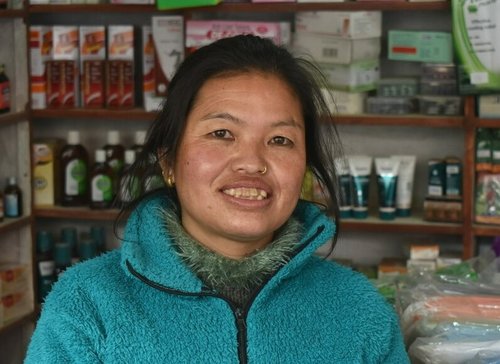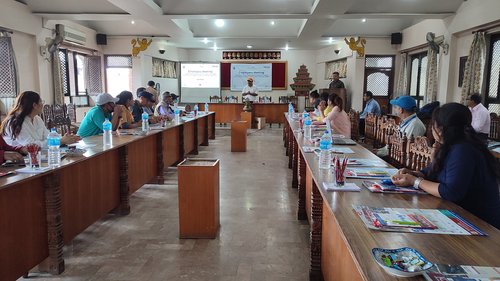The project breaking down barriers to employment for disabled people in Nepal
Heather Saranne, who oversees our projects in Nepal, reports back on an inspiring and encouraging visit.
In the UK, with the Equality Act in place and a greater understanding of the issues they face, disabled people still encounter many barriers in the workplace. But in Nepal, the situation is more difficult. It was these barriers that we were looking to overcome as we launched a new project there – Fuelling Opportunities to End Unemployment for Nepalis with Disabilities (FOUND) – at the end of 2019.
A 2020 report[1] from the Institute of Development Studies on the current position for disabled people in Nepal found that households with disabled people tend to be poorer than those without and that disabled people experience stigma, prejudice and exclusion from daily life.
They are less likely to access formal education and vocational training. They also tend to have more health problems than non-disabled people, as they have limited access to health services, particularly in rural and remote areas. And disabled people are much more likely to be unemployed or underpaid as a result of negative attitudes and discrimination in the workplace, less access to public transport and ineffective implementation of disability legislation. In addition, women and girls who are disabled are doubly disadvantaged by their disability and by their gender.
Overcoming challenges
As the FOUND project began, this context meant that the task ahead of us felt like a huge challenge. And just a few short months later, the first lockdowns of the pandemic began. As in the majority of countries, most businesses in Nepal closed down or reduced their services. Some of them, such as those in the hospitality and tourism sectors, stayed closed for months. And when they did reopen, business owners and managers were focused on survival, not recruitment, and especially not recruitment of disabled people.
These changed circumstances led to a temporary change of focus for the project: self-employment. This was the only opportunity for many people at the time. A further blow to the project came just before the second COVID-19 wave hit Nepal, when the government’s cuts to the aid budget meant that the Foreign, Commonwealth & Development Office (FCDO) cut their funding for FOUND, giving us three months to close the project.
We were faced with a stark choice – destroy the hope of the disabled people we had already enrolled onto the project or find another donor. Our choice was clear, but finding new funding in the middle of a global health crisis was no mean feat. We will be eternally grateful to the Kirby Laing Trust for believing in the project and stepping in to help.
Instead of making our staff redundant, closing down employment centres and telling hundreds of disabled people that we could no longer help them, we are able to continue the life-transforming work that we had started. The trust, along with Leprosy Mission supporters, will continue to make sure the project can continue.
Success for disabled people and their employers
Despite unprecedented challenges, 465 disabled people are now in paid work and are financially more secure than ever – like Dinesh, pictured above, who is now working as a secondary school maths teacher. We recognise that not everyone will find work straight away, so we devised a tool which measures the ‘distance travelled’ towards the likelihood of getting a job. To date, 1,078 disabled people supported by FOUND feel they are more likely to find work now than before they registered with the project.

Prima, who is affected by leprosy, is one of those who have found work. After years of illness and stigma, she’s now running her own pharmacy in Kathmandu.
“Having my own pharmacy has increased my confidence and I now feel like I'm living my life," she told us. "Being independent helps me live a dignified life and be part of society."
Our team of highly motivated staff are also engaging with employers to help remove the barriers that have prevented them from employing disabled people. They encourage employers to recognise that having a workforce which includes disabled people is good for business – inclusive recruitment leads to a wider talent pool available to employers, lower employee turnover, higher productivity and an improved workplace culture.
During my recent visit to Nepal, I was privileged to visit two large employers - Prabhu Management and Unilever. Prabhu is a national financial management company that has employed ten disabled people as customer service advisors as a result of our project. As I spoke with some of the employees, I didn’t need to wait for their words to be translated to see just how satisfied they are with the support they have received from the FOUND team.
Their smiles said so much and they are overjoyed that they have now secured employment.
Unilever is currently shortlisting FOUND clients and as Nepal’s largest fast-moving goods company, this a really exciting opportunity to bring many more job opportunities to disabled people and those affected by leprosy over the coming months.

It was also great to see the innovative approaches the project is using to link disabled jobseekers to employers. The Disability Confident Employers’ Movement (DCEM) is encouraging employers to commit to inclusive recruitment by offering interviews and job opportunities to disabled people. And the Inclusive Job Portal, a job search website similar to those we have here in the UK, is aimed exclusively at disabled people and means that they can be reassured that all the job vacancies are accessible to them.
Convincing employers to change long-standing views about the skills and qualities of disabled people is difficult. And sometimes, working with disabled jobseekers can have challenges too. Often, they lack self-confidence, having been told all their lives that no-one will ever employ them, or as a result of discrimination. But the team in Nepal, made up of Employment Counsellors, Business Development Officers and support staff, have been there to support them all the way.
Delivering this project through a pandemic has been extremely challenging. Plans have changed, businesses have been affected, and opportunities have been limited by lockdowns. But throughout, FOUND has offered a unique opportunity to disabled people in Nepal, providing them with the best chance they’ve had so far to find meaningful employment that increases their self-worth as well as their income. Through difficult times, the dedicated staff team has given them hope for the future.